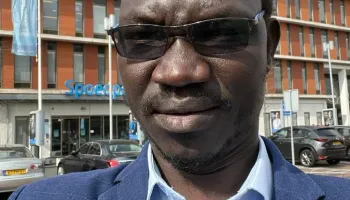Though I don’t know many things, I am proud of knowing one thing. Assuming this was the era of liberation struggle, Commander Salva Kiir Mayardit or any of his senior commanders would not command his daughter to attack an enemy position where risks of losing her life would be high. So many sons and daughters of the ordinary people died commanding forces during the 21 years of liberation.
Now in a liberated country, the daughters and sons of the liberators have been brought close to the power which is a very dangerous position like surrounding an enemy garrison. These positions of power require great knowledge, moral integrity and selflessness. Once these positions are misused for self-enrichment, it leads the country through a perilous path or even collapse of state.
I had shut down my Facebook account to have a peace of mind in the heart of Delft Municipality, however, some news of national interest cannot pass without me making a comment and this time it is the appointment of the daughter of the president as Presidential Envoy for Special Programs.
What qualification does Adut Kiir have apart from being the daughter of the president who now owns South Sudan? After wrenching off South Sudanese hands from decision making roles, he can decide to exile South Sudanese (over two million living in deplorable conditions in refugee camps/IDPs) and use their land to settle Palestinians for political and financial gains that don’t benefit the country at large. He can ferry in mercenaries to kill civilians with an intent of securing his shaky position.
The position previously occupied by Dr. Benjamin Bol Mel, now elevated to the Vice President, has existed for quite some time without anyone questioning how it came into being. What Act of parliament established the so-called Presidential Envoy on Special Programs? What does this program entail? Why does it have to be an envoy?
An envoy is a messenger or representative, especially one on a diplomatic mission or a minister plenipotentiary, ranking below ambassador and above chargé d’affaires. With this definition in mind, does the position fit existence in the office of the president when its activities are local rather than external? This also brings all other local envoys into question.
All government departments and functions must be established by the law, even the position of the president. “The President of South Sudan was established as the Head of State and Head of Government by the Interim Constitution of South Sudan. This constitution, adopted after independence in 2011, outlines the powers and functions of the President within the executive branch of government. The President is elected by universal adult suffrage for a four-year term and has precedence over all other persons in South Sudan.”
The last time I checked, the envoy on special programs was mainly in charge of Oil for Infrastructure which drained the country of resources in a sham and shoddy road projects. The Oil for Infrastructure or Crude Oil for Infrastructure became a conduit for corruption with many roads being initiated and abandoned.
Subcontracts were awarded to senior government officials with no capacity to implement the contractual obligations. They went for small foreign companies that also had limited capacity, and no roads were built but money was gone.
The renovation and upgrade of Juba-Nimule Road, for example, kickstarted in 2021 but could not move an inch, and the money disappeared. Western Equatoria roads, Torit – Juba, Bahr El Ghazal Road, The Upper Nile trunk ended in Bor, among other shoddy road projects initiated at the same time given the financial position of the government and abandoned without completion and handover to the clients usually the ministry of roads and bridges.
What is questionable in these projects is that they are not initiatives of the concerned ministries, however, unscrupulous initiatives of the office of the special programs and the concerned ministries come in as third parties without the legal responsibility to question the management of resources, design of the projects, the implementation timeline and quality of work.
It is unfathomable how the special programs office is the client and a contractor at the same time. How do you deal with conflict of interest? To whom do you handover the projects after completion? When there are defects, who demands who to make good of, within the legal defects’ liability period? Who develops the maintenance plans and who implements the plans?
The special envoy is a national scam orchestrated by the first family to impoverish South Sudan, acquire unimaginable wealth, and with wealth comes power and therefore, should be shut down by the parliament.
All infrastructure projects should be initiatives of the concerned ministries (for example, ministry of roads and bridges) if it relates to roads. It is also important to note that an infrastructure doesn’t only mean roads – drainage or irrigation canals, dykes, dams, bridges, water systems, buildings, power stations, transmission lines etc, fall in this category.
Now that we have ended up with Kiir, son-in-law, and adding the daughter as in charge of Special Programs (or oil for infrastructure – an ingenious corruption conduit), all other ministries are rendered useless. We can now have the president and the daughter in charge of South Sudan and all others go home as we wait for them to work for us.
Alternatively, if the president refuses to fund the infrastructure projects initiated by the concerned ministries for the fact that his daughter, son, son-in-law or whoever – is not responsible then South Sudan can stay without the vital infrastructure until the next president who understands how this work is elected.
The writer, Ayuen John Awan Mawak, is a South Sudanese national living in The Netherlands. He can be reached via email: ayuenawan@yahoo.com
The views expressed in ‘opinion’ articles published by Radio Tamazuj are solely those of the writer. The veracity of any claims made is the responsibility of the author, not Radio Tamazuj.




